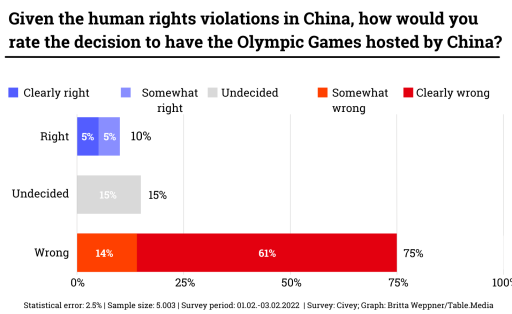Human rights are systematically disregarded in China. Although they are enshrined in the constitution, massive violations have been extensively documented. All the news on this topic is available from the Table.Media editorial team.
China society: what about human rights in China?
China systematically disregards human rights. And this although the People's Republic has anchored human rights in its own constitution since 2004. Nevertheless international human right organizations prove regularly that the People's Republic offends against the individual liberty rights of the own population. Freedom of speech, press, assembly and communication are restricted in China. Political opponents are threatened with torture. In addition, some 8,000 death sentences are carried out annually. Since President Xi Jinping has led the Chinese Communist Party (CCP), the human rights situation in China has changed drastically. All organizations and individuals who advocate free expression and a strong civil society are subject to increased surveillance and censorship. To this end, Xi Jinping issued his own National Security Law. It allows activists and critics to be punished.
Has China signed the Universal Declaration of Human Rights?
China has signed the United Nations Convention on Human Rights. This was done under political pressure from the international community. The Universal Declaration of Human Rights therefore also applies in the People's Republic. However, Amnesty International, Human Rights Watch, the UN Human Rights Council, and many activists and opposition figures within the country regularly prove that the Chinese Communist Party (CCP) does not adhere to these minimum standards. In total, the People's Republic has signed twenty UN human rights treaties. For example, the UN Covenant on Economic, Social and Cultural Rights and the Covenant on Civil and Political Rights. However, China restricts their scope of application. With reference to its status as a developing country. This allows the People's Republic to restrict the right to strike, for example.
What is the official position of the Communist Party on human rights in China?
The World Press Freedom Index 2021 lists China in 177th place out of a total of 180 countries. International interest in human rights compliance in China (CPC) has led to a worsening of the situation on the ground. For example, the Chinese Communist Party has made clear in party document number nine that freedom, democracy, and human rights are values of Western countries that are intended to undermine the power of the CPC. Human rights are defined differently in China. For example, the government of the People's Republic does not accept the universality of human rights. Although it is officially "respected," it is not followed in practice. According to the Federal Agency for Civic Education, the Chinese Communist Party operates according to three central principles: Human rights are conferred and protected by the state. Individual rights may not violate the rights of other citizens or the interests of society and the state. Rights are linked to duties to society and the state.
What human rights are violated in China?
The People's Republic of China primarily violates the freedoms of speech, press, assembly and communication. On the one hand, because the media are controlled by the state. On the other hand, because critics of the regime are arrested on the charge of endangering the state. Political freedom is also non-existent. Dissidents, dissenters or even organized opposition groups must expect drastic punishments. This is another reason why an independent judiciary is unthinkable in China under the current leadership. Freedom of movement is also restricted in China. For example, there is a population register that classifies people as "rural residents" or "urban residents. Migrant workers are considered "rural residents" regardless of their place of residence and have significantly fewer rights. Religious freedom also exists only in theory. Members of the Communist Party, for example, must be atheists. In addition, the political leadership demands control over the religious content of all reported faiths.
Tibet news: what is not allowed to be done in China?
The People's Republic violates human rights primarily when the Communist Party believes it is serving the common good. There are two laws where the government resorts to particularly draconian measures. First, no one in China is allowed to claim independence or self-determination of territory. Tibet is probably the most prominent example here. Second, it is forbidden to question the Communist Party's claim to leadership. In accordance with this interpretation, violations of human rights in China primarily affect ethnic minorities. A total of 56 of them live in the People's Republic. The various ethnic groups are allowed to speak their own languages and teach them in their schools. Unless there are local efforts at independence or attempts at democratization. The current hot spot is the Xinjiang region. Several Muslim minorities live here. Primarily Uyghurs, Kyrgyz and Kazakhs. They are under constant surveillance via cameras on the streets, thousands and thousands are in re-education camps and have to perform forced labor. The Chinese government also promotes the resettlement of Han Chinese in the region. On the one hand to monitor the minorities, on the other hand to impose Chinese culture on the minorities.
How are human rights violated in China?
Human rights are violated in various ways in the People's Republic of China. Organized political opponents of the Communist Party are particularly hard hit. They are regularly arrested and imprisoned. Even without trial. In addition, there are cases of confessions forced under torture. Before major events, it is also common for these dissidents to be arrested and temporarily detained. This is to prevent contact with any representatives of the Western press who may be present. People with disabilities also often have a harder time in China than other people. Universities, for example, are allowed to refuse them admission. Although they are allowed to attend school, they can be denied school materials that they would need due to their disability. Human Rights Watch denounces that many children with disabilities would not receive any school education at all. There are about 83 million people with disabilities in the People's Republic, of whom about 40 percent can neither read nor write.
Is there a total control through the social credit system?
Above all, the Communist Party keeps a close eye on political counter-movements, democracy efforts and attempts at independence. In order to have total control over its citizens, the government in Beijing has installed an extremely elaborate surveillance apparatus. The "social credit system". It is an attempt to enforce desirable social behavior through control, reward and punishment. Various data are linked together for the social credit system. For example, creditworthiness or criminal records. But also data from partner companies such as Tencent or Alibaba. A large part of the Chinese people's online activities takes place via their platforms. If citizens behave correctly from the Communist Party's point of view, they receive points. Those who have a lot of points are rewarded. For example, with easier access to a loan. But points can also be deducted. For example, for critical comments in the social media.
What is censored in China?
Media in the People's Republic of China are subject to strict censorship ordered by the Communist Party. According to Reporters Without Borders, this affects all media that reach a large number of people. This includes the press, SMS, short messages, television, radio, video games, film, theater, literature and the Internet. Xi Jinping, the Chinese head of state, believes that the media must first and foremost serve the party. Political content is subject to the strictest monitoring. There are a number of topics that must not be written about. First and foremost are the independence movements in Tibet and Taiwan. But the religious movement Falun Gong and the Tiananmen protests of 1989 must not be mentioned either. Reports on democracy, corruption, Maoism, police brutality or extreme wealth inequality are also forbidden.
Human Rights in China: what are the Communist Party’s Plans?
For the Chinese Communist Party, human rights are an attempt to weaken the People's Republic. Freeing its own citizens from poverty is the "true realization of human rights." In early 2021, President Xi Jinping officially declared an end to poverty in China. However, steps toward more human rights have not been taken since then. On the contrary, Amnesty International emphasizes that China's action plan on human rights in its own country does not even address key issues such as freedom of expression, censorship and the death penalty. In fact, it is often unclear in China to whom human rights apply and to whom they do not. For example, environmental protests against aluminum smelters would be suppressed. However, reports about polluted farmland are allowed. There are successful lawsuits by NGOs against environmental offenders, as the Federal Agency for Civic Education (BpB) writes, but environmental activists would also be arbitrarily arrested. Human rights would serve the enforcement of the political agenda, writes the BpB.
What is the future of human rights in China?
The Federal Agency for Civic Education analyzes that an improvement of human rights in China is only possible if the Communist Party establishes an independent judiciary, ends censorship and allows freedom of expression and assembly. However, it also states that this is "impossible under the current leadership." What changes and news there are on human rights in China, reports the editors of Table.Media.




